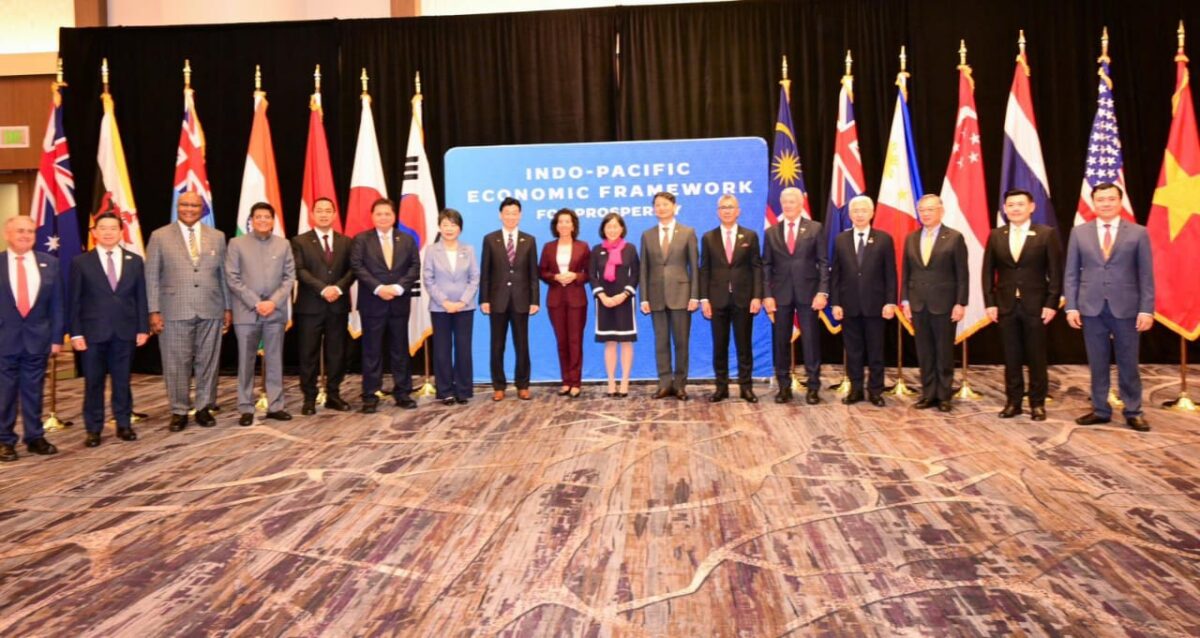India along with 13 other IPEF member countries, has signed a pact intended to strengthen supply chain on the global stage. The main focus of the agreement is to find solutions and alleviate the economic disruptions due to the supply chain shocks and to cut down dependence on China.
Table of Contents
India, the US and other IPEF member countries have signed a pact for supply chain resilience which would have significant contributions toward alleviating the risks arising from the economic disruptions and would help in improving crisis coordination.
Union Minister Piyush Goyal signs the Pact
Union Minister of Commerce and Industry, Piyush Goyal, signed the agreement on behalf of India in San Francisco. According to Union Minister Piyush Goyal, this agreement is a first-of-its-kind international pact that will help in fortifying and strengthening the supply chain in the global space. It would also play a significant role in fostering sustainability and adaptability. Goyal also stressed on enhancing collaboration to fulfill the aims of the framework.
Goyal emphatically stressed on the need to mobilize finance to enhance cooperation in technology. The Union Minister also urged to implement cooperative work under this economic initiative. The Commerce and Industry Ministry in its official statement also stated that the agreement will help to make the supply chains more resilient and well-integrated thereby helping in economic development and progress.
The global health catastrophe in the form of COVID-19 has disrupted the entire supply chain and most countries are dependent on China for different products. This agreement will play a vital role for the IPEF partners to reduce their dependence on Chinese products. The Union Minister signed this crucial agreement along with other ministers of IPEF member countries.
The ministers had constructive discussions on the agreement. Goyal also held significant bilateral discussions and meetings with Gina Raimondo, US Secretary of Commerce and Tengku Zafrul Aziz, Minister of International Trade and Industry, Malaysia, based on the IPEF Ministerial dialogue.
What is IPEF?
IPEF stands for Indo-Pacific Economic Framework for Prosperity. IPEF has 14 member countries namely India, Australia, the US, Japan, Fiji, Korea, New Zealand, Singapore, Thailand, Brunei, Indonesia, Malaysia, the Philippines and Vietnam which represent around 40% of the world’s GDP. Seven of these member countries also belong to the ASEAN group. Fiji is the most recent country to have joined IPEF on 27th May 2023. This initiative was launched by Joe Biden, the President of the United States of America in 2022 in Tokyo. Describing the economic framework, Biden had once remarked that it would set “new rules for the 21st-century economy” and would help the economies of the member countries to “grow faster and fairer”.
The framework was designed to make the Indo-Pacific Region, a hub of global economic growth. The initiative has been built on the four pillars of supply chain resilience, clean energy, taxation and anti-corruption as well as fair and flexible trade.
Importance of IPEF
The economic framework is significant in countering China since all the members share the same worry about China’s expansionist ambitions. The main focus of the initiative is the economic progress and technological advancement of the member nations in the Indo-Pacific region. After India walked out of RCEP (Regional Comprehensive Economic Partnership), it joined IPEF intending to expand economic cooperation. The other benefits of the framework also include investment mobilization, providing support and assistance to MSMEs (Micro Small Medium Enterprises) and creating an ecosystem that would enhance a smooth flow of Indian products.
India also hosted a special round of discussions in 2023 covering three of the basic pillars of IPEF. It is estimated that around 300 officials from different countries participated in the negotiations.



